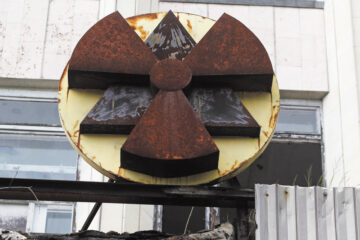How does it feel to be white?

A Bisel Kisel with Masha Kisel, The Dayton Jewish Observer
“Am I white?” is not a question I would have asked 10 years ago because all I had to do was look in the mirror to learn the answer.
Since 2016, however, I have become more aware of whiteness as an unstable sociohistorical construct that, depending on the context, might exclude Ashkenazi Jews. And I am not the only one.
Emma Green’s Are Jews White? was published in The Atlantic just a month after the 2016 presidential election as a response to the rise of the “alt-right.”
A more recent article by Atiya Husain with the same title in Slate documents a legal case of a Christian convert who was denied a position as a football coach because of his “Jewish blood.”
Jewish identity is a constellation of ethnicity, culture, and religion, with a very long history of discrimination and persecution. How do we map all that complexity onto discussions of Jewishness and race in America?
In America, a country built on the bones of indigenous people and on the broken backs of black slaves, the history of whiteness denotes domination, oppression, cruelty.

Whiteness also signifies access to restricted spaces and scarce resources. Although Jewish immigrants from Europe never suffered the same degree of injustice here in America as have indigenous Americans or African Americans, they were, at various points in history, not considered white.
Jewish Americans benefited from the Naturalization Act of 1790, which declared full citizenship to “all free white persons;” Jews had full legal rights while black Americans were slaves and Chinese Americans could not become citizens.
Yet, in practice, Jewish people were barred from certain jobs and neighborhoods for several hundred more years.
The popularity of the bogus science of eugenics in early 20th century America stereotyped Jews as “physically inferior.” Unflattering portrayals of Jewish neurotic weaklings persist in American popular culture to this day.
Despite any social discomfort that Jews might feel, Nylah Burton, a Jewish woman of color, asks Ashkenazi Jews to remember their institutional white privilege in White Jews, Stop Calling Yourselves White-Passing, published in the Forward, July 2, 2018.
She admits that antisemitism poses a threat to Ashkenazi Jews, but “it is rarely coded into every aspect of our lives,” the way race is.
“You may not feel white,” she writes “but that doesn’t take away the privilege. In America, race is not a choice. It’s assigned.”
So how does it feel to be white, and why don’t Ashkenazi Jews feel it?
Until fairly recently, white identity was not broadly discussed. As writer Junot Diaz puts it: “We live in a society where default whiteness goes unremarked — no one ever asks it for its passport.”
You know that you’re white when you don’t think about what you are. Scholar Zachary Braiterman distinguishes the privileged experiences of white Jews from the discrimination faced by people of color.
Still, he classifies Ashkenazi Jews as “off-white” because, as he argues, Jewish people often experience the self-conscious unease of a minority. They may feel white in predominantly Jewish communities, but that’s not the case in much of America.
As Braiterman puts it: “whiteness is a majority status, a ‘comfort’ or fit into the general order of things as norm. Comfort is a psycho-physical, political disposition. You count among the majority.
As part of a majority, there is no larger and more powerful thing out there to perturb one’s sense of self or place in the world.”
As a new immigrant in America, I didn’t feel that comfort, but my whiteness gave me the advantage of positive perception.
From grade school through college, I relied on government assistance but was never made to feel like a burden on the system.
I was a wise investment, a success story in the making, a “good girl,” no matter how hard I tried to be bad. I am especially aware of the generous narratives adults projected onto me when I think about the dehumanizing comments about Central American and African refugees made by the same people who sincerely welcomed Soviet Jews in the 1980s and 1990s.
But even though I have experienced white privilege, it doesn’t feel permanent. I remember the day after the 2016 presidential election, a Jewish American friend of mine posted on Facebook: “I can hear the sound of jackboots at my doorstep.”
She wasn’t being literal, but I knew exactly what she meant. The stable ground of the present moment was ripped asunder and what yawned beneath was the terrible, toothsome maw of history.
The vulnerability of people of color, of LGBTQ folk, of undocumented families dwarfed my own. And yet, the hateful rhetoric of the Trump campaign, which turned out not to be just empty talk — but turned to hateful action — felt and feels personal.
So many Americans were unwitting time travelers on the day after the election, each of us transported to our own historical nightmare.
“Would history repeat itself?” we asked.
It’s a special kind of privilege to fear the future. Although Jewish people are not yet being stripped of their civil rights, other groups are. That feeling of vulnerability, of “not feeling white” is not a denial of others’ suffering, it’s a tool of solidarity.
Many Jews today are acting on that sentiment by protesting at ICE detention facilities, standing up for racial justice, for equal rights of all people to love and marry, and by supporting their Muslim brothers and sisters who have been perhaps the most directly targeted by this administration.
If whiteness equals privilege and power, then those of us who possess it institutionally but don’t feel it subjectively have the political tools and the moral imperative to protect the most vulnerable among us.
Dr. Masha Kisel is a lecturer in English at the University of Dayton.
To read the complete December 2019 Dayton Jewish Observer, click here.




